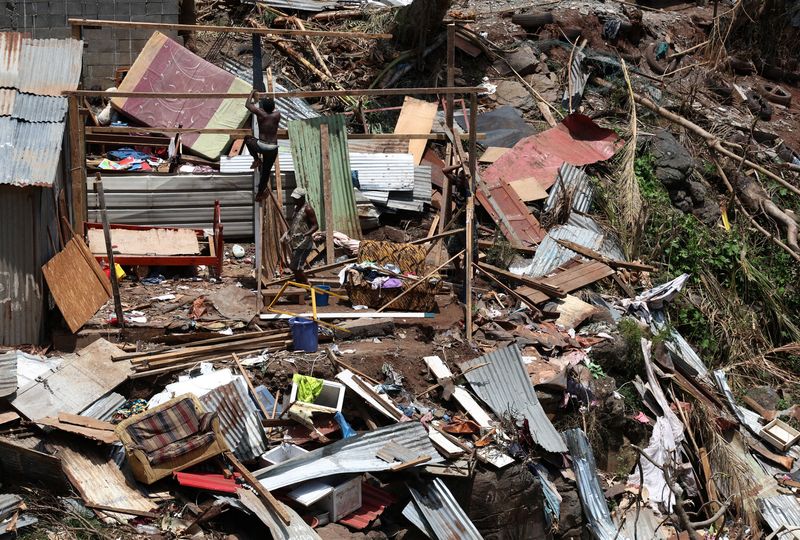By Gabriel Stargardter and Juliette Jabkhiro
PARIS (Reuters) - Mayotte was already struggling with overcrowding, illness and poverty before a devastating cyclone hit the French island territory at the weekend.
Now the aftermath of Cyclone Chido has led to accusations that Paris has neglected its far-flung overseas territories, leaving them with little protection when natural disasters strike.
"Mayotte was not prepared," said Racha Mousdikoudine, president of the Mayotte Is Thirsty water advocacy group.
More than 20 deaths have been confirmed after Chido hammered the Indian Ocean archipelago but officials say hundreds or even thousands more could be dead. Authorities are delivering aid and sending personnel to stave off hunger, disease and lawlessness.
Their inability to give even a vaguely accurate death tally days after the storm hit underlines the challenges they face in what is France's poorest overseas territory.
Rights groups have long accused Paris of turning its back on overseas departments like Mayotte, which was colonised in 1843 and where more than 75% of its roughly 321,000 people today live below France's national poverty rate.
Mayotte has France's lowest GDP per capita - 10,600 euros - compared with 63,300 euros in the Ile-de-France region that includes Paris.
"A cyclone, fuelled by climate change, struck an abandoned French territory," Melanie Vogel, a senator from the Europe Ecology party, wrote on X.
The archipelago has become a magnet for illegal immigration from the Comoros islands, fuelling anger among residents over crime, inflation and stretched public services.
Other French island territories have also been rocked by protests this year.
In New Caledonia in the Pacific, riots erupted over long-standing demands for independence. In Martinique and Guadeloupe in the Caribbean, people have grown exasperated by higher costs and lower living standards than those in mainland France.
CLIMATE CHANGE
Those existing inequalities are likely to be magnified by climate change, experts say. According to the Intergovernmental Panel on Climate Change, hotter temperatures threaten small islands with harsher cyclones and rising sea levels.
"I think that not enough investment has been made to protect Mayotte from the worst effects of climate change," said Samira Ben Ali, a youth climate advocate from Mayotte, who blamed the severity of the storm on unusually high sea temperatures.
"And as we have seen right now, everything has been destroyed."
The French Development Agency's (AFD) 2022-2026 Mayotte strategy plan found the archipelago was particularly vulnerable to climate change. Powerful cyclones threaten Mayotte's port and airport.
"Damage to these infrastructures could paralyze the territory's economy," it said.
Rising temperatures had already caused droughts that were exacerbating a chronic lack of fresh water, the AFD said.
Last year, in response to the water crisis, France's government froze the price of water sold in shops and used the military to fly in bottled water for tens of thousands of thirsty residents.
Anthony Foucher, a researcher at Climate and Environment Sciences Laboratory in France, said more intensive farming on Mayotte over the last 20 years had degraded its soil, leaving it more exposed to flash floods and water contamination.
CHOLERA FEARS
Mayotte also suffers from outbreaks of hepatitis A, cholera and typhoid fever that are virtually non-existent back in France, a 2022 Senate report found. More than a quarter of the population is obese, an affliction usually associated with far richer regions, the report found.
The Comoros migration - around 100,000 people live in Mayotte without papers, according to authorities - was adding to pressure on the healthcare system, the report said.
The migration wave, which led to violent unrest in 2018, has also contributed to a deterioration in Mayotte's public security, a 2021 Senate report found.

Violent robberies rose nearly 300% between 2008 and 2019, while sexual violence jumped by nearly 200% over the same period, the report said.
With half the population under 18, and a third under 10 years of age, "the economic development of the Mayotte territory remains insufficient to offer sufficient future prospects to this young and large population," it said.
